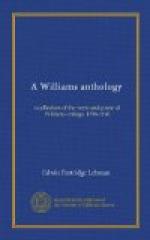“But I’m goin’ to see it all now.” He brightened up again. “Yes, sir, poor Mandy’s fixed so she can’t leave the house now, kind of laid up with rheumatiz. A spell back, though, when our daughter got married, an’ time kind o’ hung heavy on our hands, Mandy says, ’Why don’t you go alone, pa? Now’s a good chance. So I fixed things up spick an’ span, an’ Nancy—that’s our girl—come over this mornin’ to stay with her ma, an’ I—well, it’ll be grand! D’you s’pose I c’n see it all in one day?”
“Oh, yes.”
“Well,” he sighed contentedly, “that’s good. Say, you’ve bin awful good to me, tellin’ me all about Ebenezer. I’m glad I met some one who’s had experience in such a big town.” Silence for a minute. Then he leaned over confidentially.
“D’y’ know, it sort o’ seems ’s though the sunshine was a leetle bit brighter to-day than usual, all on ‘count of my goin’ to Ebenezer. Only I wish Mandy c’d be along.”
“Ebenezer!” yelled the brakeman. “Ebenezer!”
Literary Monthly, 1906.
A NEW LIFE IN READING
J.O.S.E.
When we were at home the gas always went out at a certain time, and if we were tempted to finish just one more chapter of Coral Island or Out on the Pampas, we needs must steal a candle from the pantry stock and furtively read by its flickering light. Our own sense of danger, together with the imaginative effect wrought upon our excitive minds by the dancing candlelight and the awesome shadows of the still house, gave a strange relish to our childhood reading.
At boarding-school we found (among its other strange things) the electric light. At nine-thirty the bell in the chapel sounded taps, and all the lights in the school were extinguished simultaneously. Then the master would make his rounds and find the whole school evidently asleep in their beds. But presently doors would open and books would be read by the light in the hall. Still we had that same adventurous feeling in our readings, still that sweet taste of stolen fruit.
When we were graduated from the boarding-school, put away the proverbial childish things, and came to college, we were given a freedom such as we had never had before. No interfering master, no provoking lack of light to annoy us. We could burn our lamps all night, and receive no paternal rebuke or master’s chastisement. And now, though there is none of that sweetness of stolen fruits, none of that creeping insecurity of former readings, there is an undisturbing, quiet secureness that makes our books more living to us. Now, when all the dormitory is asleep; when the lighted windowpanes have ceased to cast their gleams upon the snow; when the streets are deserted, the pool-rooms closed, and the last good-fellow has gone to bed, and only oneself is awake, then we have the full enjoyment of our quiet study lamp-light. We may yawn once or twice,




